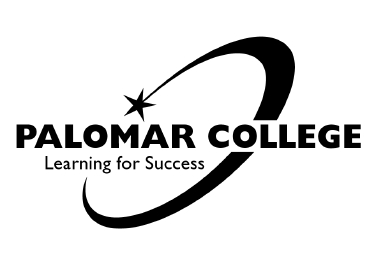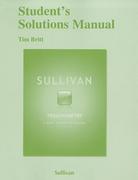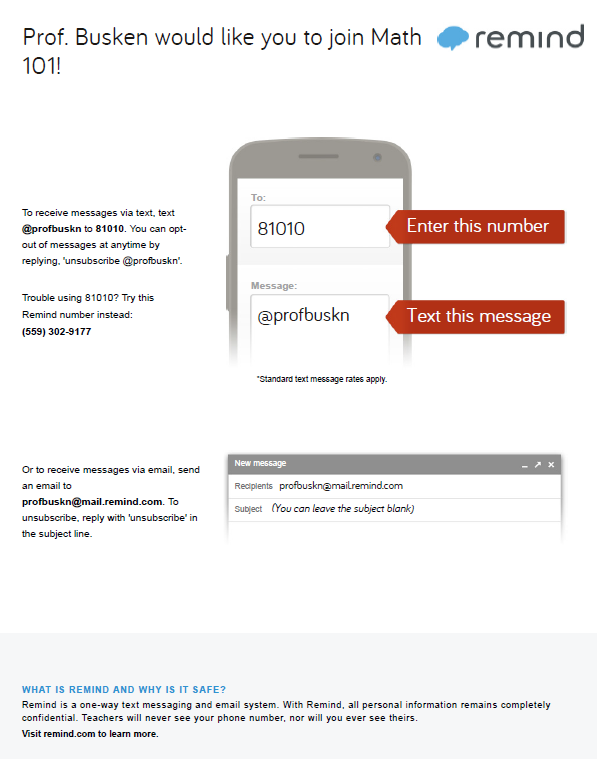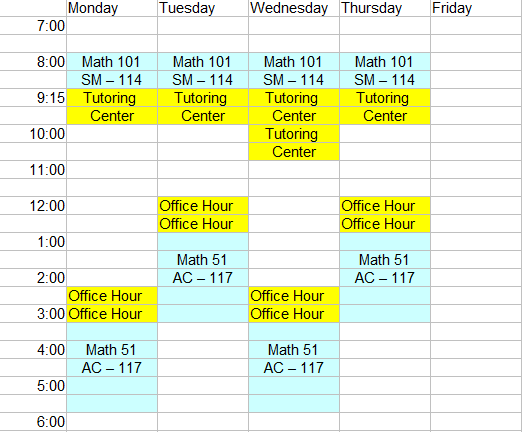-
WelcomeStudents!!This is our Math 101 course website. I will post the course syllabus and calendar here,as well as any worksheets and test reviews used in the class. I look forward to workingwith you!!!
-
 is a Gateway:Trigonometry:understanding it will help youunderstand science, technology,engineering and other maths!
is a Gateway:Trigonometry:understanding it will help youunderstand science, technology,engineering and other maths!

Your success is our goal!!
Free Tutoring @TLC
No Appointment Needed
Palomar College offers free, walkin tutoring in the Teaching & Learning Center (TLC), located in LRC-503 inside the Learning Resource Center building. You will find a quiet, comfortable space to work in where you can get both tutor and instructor help. Computers are available for you to work on. Come check it out!
Course Calendar
loading...
My Office Location:
-
SM — 123C
Office Hours:
-
9:25 — 10 am MTWTh in the tutoring center.
-
10 — 11 am on Wed. in the tutoring center.
-
2:30 — 3:10 pm on Mon. & Wed. in my office.
-
12 — 12:40 pm on Tues. & Thurs. in my office.
Links
-
Eratosthenes Earth Radius Calculation
-
Sextant Geogebra Worksheet
-
How a Sextant Works
-
Navigating by Sextant
-
Sine & Cosine Functions — Unit-Circle PDF Animation
-
2.2 Worksheet — Trig Functions: Unit Cirle Approach
-
Terminal Points of Common Angles in \( [0, 2\pi) \)
-
2.3 Worksheet — Properties of Trig Functions / Fundamental Identities
-
The graph of \(y=\sin(x)\)
-
The graph of \(y=\cos(x)\)
-
The graphs of \(y=A\cos(\omega x)+B\) and \(y=A\sin(\omega x)+B\)
-
How to graph \(y=A\cos(\omega x)+B\) and \(y=A\sin(\omega x)+B\)
-
Tangent and Cotangent
-
The graphs of \(y=\tan(x)\) and \(y=\cot(x)\)
-
MalinC's Geogebra Book
-
How to graph \(y=A\tan(\omega x)+B\) and \(y=A\cot(\omega x)+B\)
-
How to graph \(y=A\cos(\omega x-\phi)+B\) and \(y=A\sin(\omega x -\phi)+B\)
Quizzes
Syllabus
Math 101 — Trigonometry
Professor Tim Busken
Office Location: SM – 123C
Office Hours:
9:25 – 10 am on MTWTh in the tutoring center
10 – 11 am on Wed. in the tutoring center
2:30 – 3:10 pm and on Mondays and Wednesdays in my office
12 – 12:40 pm on Tues. & Thurs. in my office
Telephone: 559-791-2226
Email Address:
timothy.busken@portervillecollege.edu
Website: timbusken.com
Section 30253
MTWTh 8:00—9:15 am SM 114Final Exam:
Monday, May 11 7:30 — 9:30 a.m.
Grading
50% — Tests25% — Quizzes
25% — Final Exam
Note: This instructor reserves the right to add, change or modify the
syllabus and calendar, including test days, by announcing such changes in class.
Numerical course grades are rounded to the nearest whole percentage and translate to a letter grade.
A = 90% — 100% B = 80% — 89% C = 70% — 79% D = 60% — 69% F = 0% — 59%
Numerical course grades are rounded to the nearest whole percentage and translate to a letter grade.
A = 90% — 100% B = 80% — 89% C = 70% — 79% D = 60% — 69% F = 0% — 59%
Book (required): Trigonometry: A Unit Circle Approach by Sullivan, 9th edition, 2012.
This course covers chapters 2 through 6.
Having a book or ebook is mandatory. Having a license for MyMathlab is not required, but I will make the resource available for those who desire to use it for doing homework or extra practice problems.ISBN: 0321716574,
Publisher: Pearson
Book (optional): Student Solutions Manual for Trigonometry: A Unit Circle Approach by Sullivan, 9th edition, 2012.
If you bought the textbook with the MyMathlab license, then you will have access to an ecopy of the student solutions manual. If you want to purchase a physical copy of the manual here is the ISBN: 0321717023.


Communication: I will send announcements and reminders to the class via email and text message. I will send out email to the class through insidePC. If you want to get announcements from me via text message, please use your phone to sign up by texting “@profbuskn” to 81010.

Prerequisite:
Mathematics P051 or a "C" or higher in second
semester of high school intermediate algebra.
Course Description: Total lecture 90 hours. A study of the meaning of the trigonometric ratios unit, circle relations, graphs of the trigonometric function, logarithmic and exponential functions, solution of oblique and right angles, complex numbers.
Student Learning Outcomes SLOs are the specific measurable goals and results that are expected subsequent to a learning experience. These outcomes may involve knowledge (cognitive), skills (behavioral), or attitudes (affective) that provide evidence that learning has occurred as a result of a specified course, program activity, or process. By completing this course, you should be able to:
1. Demonstrate knowledge of trigonometric functions, properties, and identities.
2. Demonstrate proficiency in graphing trigonometric functions.
3. Demonstrate knowledge of the fundamental properties of vectors and complex numbers.
4. Demonstrate knowledge of the basic properties of logarithms.
Academic Accomodation: Students with a verified disability may qualify for alternate media, extended time testing, and other various accommodations provided by the Disability Resource Center. Students with disabilities who may need accommodations in this class are encouraged to contact Disability Resource Center (DRC) early in the semester so that reasonable accommodations may be implemented as soon as possible. Students may contact DRC in person in AC 115 or by phone at 559-791-2215.
Gradebook: I will send out a grade report at the end of each week via email.
Required Materials: Textbook or ebook, Pencils, Erasers, Notebook or 3 ring binder, Scientific Calculator and
Calculator Note: Please bring a calculator to class each day. If you are going to buy a scientific calculator, a good choice is the TI-30XIIS, which costs about $15. Calculator use in the class and on tests will be very minimal. It is encouraged that you refrain from using a calculator when doing the homework, unless otherwise instructed, so that you are simulating the conditions of the test. Calculators are only allowed on one or two tests. If calculator use is allowed on a test, students are forbidden to share a calculator.
Course Description: Total lecture 90 hours. A study of the meaning of the trigonometric ratios unit, circle relations, graphs of the trigonometric function, logarithmic and exponential functions, solution of oblique and right angles, complex numbers.
Student Learning Outcomes SLOs are the specific measurable goals and results that are expected subsequent to a learning experience. These outcomes may involve knowledge (cognitive), skills (behavioral), or attitudes (affective) that provide evidence that learning has occurred as a result of a specified course, program activity, or process. By completing this course, you should be able to:
1. Demonstrate knowledge of trigonometric functions, properties, and identities.
2. Demonstrate proficiency in graphing trigonometric functions.
3. Demonstrate knowledge of the fundamental properties of vectors and complex numbers.
4. Demonstrate knowledge of the basic properties of logarithms.
Academic Accomodation: Students with a verified disability may qualify for alternate media, extended time testing, and other various accommodations provided by the Disability Resource Center. Students with disabilities who may need accommodations in this class are encouraged to contact Disability Resource Center (DRC) early in the semester so that reasonable accommodations may be implemented as soon as possible. Students may contact DRC in person in AC 115 or by phone at 559-791-2215.
Gradebook: I will send out a grade report at the end of each week via email.
Required Materials: Textbook or ebook, Pencils, Erasers, Notebook or 3 ring binder, Scientific Calculator and
Calculator Note: Please bring a calculator to class each day. If you are going to buy a scientific calculator, a good choice is the TI-30XIIS, which costs about $15. Calculator use in the class and on tests will be very minimal. It is encouraged that you refrain from using a calculator when doing the homework, unless otherwise instructed, so that you are simulating the conditions of the test. Calculators are only allowed on one or two tests. If calculator use is allowed on a test, students are forbidden to share a calculator.
Make Up Tests:
There will be 5 tests which make up 50% of your overall grade. I will drop your lowest test score from this calculation. There is a mandatory, comprehensive final exam worth 25%. Each student must take the final exam to earn a passing grade in the class. There will be no makeup tests for any reason. Each test will be a 40--75 minute test with 8--25 questions on it. Be prepared to show your work on all assignments and tests in a clear and organized fashion.
Quizzes: There will be 16 take-home quizzes (one per week) worth 25\% of your overall grade. I will drop the lowest three quiz scores before making that calculation. However, quizzes are due at the beginning of class on the day they are due. 20\% comes off of the quiz score if the quiz is turned in after I start class, or anytime within 24 hours of being due, regardless of the reason it is late. You are not allowed to work together on quizzes and you are not to seek or receive mentor/tutor help with your quizzes. You can seek or receive mentor/tutor help on problems from out of the text that are similar to quiz problems though.
Homework: Homework will be assigned for you to do from out of the textbook or via my mathlab (your choice), but it is not worth any points. It is advised that you do the assigned homework before attempting to complete your take-home quizzes. Odd numbered problems (the answers are in the student solutions manual) will be assigned. Take-home quiz questions will be similar to homework problems.
Class Attendance: Class attendance is an integral part of the learning process for this course. Students are expected to attend class regularly, as well as to arrive and depart on time. Students with excessive absences (including tardiness) may be withdrawn from the class. Note that although college policy provides for a certain number of class absences, that number covers all types of absences, including absences such as those due to documented illness or other emergency; absences for illness or emergencies are not accommodated in addition to those allowable under the attendance policy. Students may be withdrawn after more than two weeks absence of any kind. Students are expected to notify me by email if they were or are going to be absent or late.
Course Procedures: The format of the class will be a combination of in-class activities, group work, discussion, procedures and mini-lectures. Homework will be assigned daily. Questions on homework will be discussed at the beginning of each class meeting. It will be your responsibility to complete and correct homework problems and make sure you understand them. Lecture: Attending class is an important component of learning. Each meeting includes some notes and discussion to help clarify and understand the main ideas of the sections covered. Students who miss class are still responsible for announcements or changes regarding the course outline, class activities, homework assignments, due dates and exam dates.
Please come to lecture alert and prepared to learn. Prior to class, skim through the section and work some of the examples. After lecture, reread the text and review your lecture notes before starting the homework set. Number of hrs per week outside of class that students are expected to devote to the course: 10-20 hours per week outside of class. If you don’t like the grade you are getting, throw more time at the problem. Students are encouraged to form study groups. Get tutoring from TLC, and find help from the internet with youtube and Khan Academy videos.
Participation: It is your obligation, as well as your responsibility, to participate in class discussions and in-class assignments. I encourage everyone to be active learners; this means you ask questions in class whenever you do not understand something. I advise you to get to know your classmates and to work in groups outside of class, if possible.
Learning Center Hours
Monday 8:00 a.m. – 6:00 p.m.
Tuesday 8:00 a.m. – 7:00 p.m.
Wednesday 8:00 a.m. – 7:00 p.m.
Thursday 8:00 a.m. – 6:00 p.m.
Friday 8:00 a.m. – 12:00 p.m.
Academic Integrity Cheating is considered fraud. If you are caught cheating, you may be given a grade of “F” for the assignment or exam. Behavior: Class time is valuable. You are expected to be courteous to each other and to the instructor. You will be asked to leave the class for display of behavior the instructor deems as disruptive to the class environment. If you are disruptive in class (after being warned), you could be suspended from the course for up to 2 days. Comments about another’s race, ethnicity, accent, appearance, intelligence, or sexual orientation will not be tolerated on any level. Students should be familiar with the college’s "Student Code of Conduct" and "Student Discipline Procedures."
Quizzes: There will be 16 take-home quizzes (one per week) worth 25\% of your overall grade. I will drop the lowest three quiz scores before making that calculation. However, quizzes are due at the beginning of class on the day they are due. 20\% comes off of the quiz score if the quiz is turned in after I start class, or anytime within 24 hours of being due, regardless of the reason it is late. You are not allowed to work together on quizzes and you are not to seek or receive mentor/tutor help with your quizzes. You can seek or receive mentor/tutor help on problems from out of the text that are similar to quiz problems though.
Homework: Homework will be assigned for you to do from out of the textbook or via my mathlab (your choice), but it is not worth any points. It is advised that you do the assigned homework before attempting to complete your take-home quizzes. Odd numbered problems (the answers are in the student solutions manual) will be assigned. Take-home quiz questions will be similar to homework problems.
Class Attendance: Class attendance is an integral part of the learning process for this course. Students are expected to attend class regularly, as well as to arrive and depart on time. Students with excessive absences (including tardiness) may be withdrawn from the class. Note that although college policy provides for a certain number of class absences, that number covers all types of absences, including absences such as those due to documented illness or other emergency; absences for illness or emergencies are not accommodated in addition to those allowable under the attendance policy. Students may be withdrawn after more than two weeks absence of any kind. Students are expected to notify me by email if they were or are going to be absent or late.
Course Procedures: The format of the class will be a combination of in-class activities, group work, discussion, procedures and mini-lectures. Homework will be assigned daily. Questions on homework will be discussed at the beginning of each class meeting. It will be your responsibility to complete and correct homework problems and make sure you understand them. Lecture: Attending class is an important component of learning. Each meeting includes some notes and discussion to help clarify and understand the main ideas of the sections covered. Students who miss class are still responsible for announcements or changes regarding the course outline, class activities, homework assignments, due dates and exam dates.
Please come to lecture alert and prepared to learn. Prior to class, skim through the section and work some of the examples. After lecture, reread the text and review your lecture notes before starting the homework set. Number of hrs per week outside of class that students are expected to devote to the course: 10-20 hours per week outside of class. If you don’t like the grade you are getting, throw more time at the problem. Students are encouraged to form study groups. Get tutoring from TLC, and find help from the internet with youtube and Khan Academy videos.
Participation: It is your obligation, as well as your responsibility, to participate in class discussions and in-class assignments. I encourage everyone to be active learners; this means you ask questions in class whenever you do not understand something. I advise you to get to know your classmates and to work in groups outside of class, if possible.
Learning Center Hours
Monday 8:00 a.m. – 6:00 p.m.
Tuesday 8:00 a.m. – 7:00 p.m.
Wednesday 8:00 a.m. – 7:00 p.m.
Thursday 8:00 a.m. – 6:00 p.m.
Friday 8:00 a.m. – 12:00 p.m.
Academic Integrity Cheating is considered fraud. If you are caught cheating, you may be given a grade of “F” for the assignment or exam. Behavior: Class time is valuable. You are expected to be courteous to each other and to the instructor. You will be asked to leave the class for display of behavior the instructor deems as disruptive to the class environment. If you are disruptive in class (after being warned), you could be suspended from the course for up to 2 days. Comments about another’s race, ethnicity, accent, appearance, intelligence, or sexual orientation will not be tolerated on any level. Students should be familiar with the college’s "Student Code of Conduct" and "Student Discipline Procedures."
Cell Phone Policy: The use of cell phones, smart phones, smart watches or other mobile communication
devices is disruptive, and is therefore prohibited during class.
Cell phones/electronic devices and their use (rather misuse) have become a huge issue in all academic institutions. They hinder and distract the instructor and other students inside classrooms. In order to respect the important work of the classroom and the teaching and learning environment, this document is to clarify the cell phone electronic devices policy for our classroom. The policy is:
Cell phones/electronic devices can be used before the class and during break (if applicable).
Cell phones/electronic devices must be turned OFF or in vibrate mode when you enter the classroom, and stored away from your desk.
Once inside the classroom, cell phones and electronic devices must not be visible under any circumstances (for example, halfway hanging out of your purse or pocket or backpack) — even though they are OFF.
Absolutely no texting during class and you may not place the device on your lap.
First offense: if a cell phones/electronic device rings, or is visible anytime during class or you are caught using it (or texting) during class time, you will be reminded of the policy.
Second offense and beyond: The student will have to meet with me after class in my office for counseling
Cell phones/electronic devices and their use (rather misuse) have become a huge issue in all academic institutions. They hinder and distract the instructor and other students inside classrooms. In order to respect the important work of the classroom and the teaching and learning environment, this document is to clarify the cell phone electronic devices policy for our classroom. The policy is:
Cell phones/electronic devices can be used before the class and during break (if applicable).
Cell phones/electronic devices must be turned OFF or in vibrate mode when you enter the classroom, and stored away from your desk.
Once inside the classroom, cell phones and electronic devices must not be visible under any circumstances (for example, halfway hanging out of your purse or pocket or backpack) — even though they are OFF.
Absolutely no texting during class and you may not place the device on your lap.
First offense: if a cell phones/electronic device rings, or is visible anytime during class or you are caught using it (or texting) during class time, you will be reminded of the policy.
Second offense and beyond: The student will have to meet with me after class in my office for counseling


